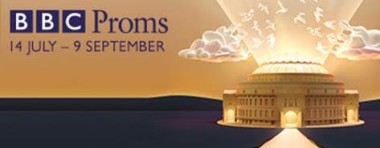
 United Kingdom 2017 BBC PROMS 41 – R. Shankar/Glass, Passages: Anoushka Shankar (sitar); Alexa Mason (soprano); Gaurav Mazumdar (sitar); Ameed Ali Khan (sarod); Nick Able (tanpure); Ravichandra Kulur (bansun/vocalist); Pirashanna Thevarajah (ghatam/kanjira/morsing); M. Balachandar (mridangam); Sanju Sahal (tabla); Britten Sinfonia/Karen Kamensek (conductor). Royal Albert Hall, 15.8.2017. (CC)
United Kingdom 2017 BBC PROMS 41 – R. Shankar/Glass, Passages: Anoushka Shankar (sitar); Alexa Mason (soprano); Gaurav Mazumdar (sitar); Ameed Ali Khan (sarod); Nick Able (tanpure); Ravichandra Kulur (bansun/vocalist); Pirashanna Thevarajah (ghatam/kanjira/morsing); M. Balachandar (mridangam); Sanju Sahal (tabla); Britten Sinfonia/Karen Kamensek (conductor). Royal Albert Hall, 15.8.2017. (CC)
This was fascinating repertoire for a Late Night Prom, and with sitar royalty to seal the deal: Anoushka Shankar, daughter of Ravi. And Ravi it was who collaborated with Philip Glass on the album Passages, which came out in 1990 on Atlantic Records. Shankar had a huge influence on Glass after their encounter in the 1960s (they collaborated on the music for the film Chappaqua). The points of contact between Indian music and Glass enable this project to work: on a very simplistic level, both musics invoke meditative states and can rise to incredibly fast-moving complexity.
The intertwining of Shankar and Glass was never less than fascinating here. While Glass’ expression might certainly take the upper hand in the opening “Offering,” scored for the Western forces, in actual fact the saxophone melody is a raga composed by Ravi Shankar himself.
The Indian group takes precedence in the second movement, “Sadhanipa” (the title is the first four notes of the melody, “Sa – Dha – Ni – Pa”). The unhurried opening of this movement, here with a long sitar solo with the rhythmic basis slowly unfolding, ended with one single note taken as a bridge to the trumpet solo. The sitar adding its own take on Glass’ repetitive patterns was inspired: at that moment, the instrument had a foot in both camps, at once pointing towards the origins of Glass’ methodology while simultaneously being involved in those very processes itself.
There was no missing the Glass language in “Channels and Winds,” where a wordless voice is added to the texture, here the excellent Alexa Mason, whose sense of legato was spot-on. What emerged, as the instrumental complexities increased and increased, was Glass’ equivalent of a Cantus Firmus.
The fourth movement, “Ragas in Minor Scale” presents the most honest attempt at a melding of Eastern and Western sound-worlds and techniques in the six movements. The melodic line can be terrifically expressive (there are two themes by Shankar and one by Glass), enhanced by tremendous rhythmic energy. A passage that has sitar set against harp is simply magical. Against this, the “complex Glass” of the fifth movement (rapid, exulting in its own vivacity, velocity and rhythmic playfulness) creates a wonderful sense of contrast. This fifth movement, “Meetings along the edge,” has an almost Stravinskian approach to an implied bitonality at times against a very Indian-style theme.
Finally, “Prashanti,” (“Peace”) which included a lovely male vocal part provided by Ravichandra Kulur; the text is a prayer for Spiritual awakening, imploring a movement away from negative emotions. There is a terrific sense of struggle for peace here; and it is the sitar itself that issues in a world of tranquillity.
Blogger Maria Popova, on her ever-intriguing and stimulating site Brain Pickings, made a parallel between the meeting of Ravi Shankar and Glass, and that of Einstein and Tagore (in an article on the passing of Ravi Shankar in which she discusses Passages: link here). The connection might be excused as hyperbole on the death of the Indian Master, perhaps, but it provides food for thought and, the more one listens to Passages, one wonders just how apt the comparison is.
All credit to the Britten Sinfonia under Karen Kamensek for their unflagging enthusiasm and excellence of ensemble; the Indian contributors, too, seemed entirely at home. As did Anoushka Shankar, her father’s most avid spokesperson: one remembers with affection her work on her father’s opera Sukanya, premiered at the Festival Hall in May this year.
The sprint to the tube station after a Late Night Prom is an occupational hazard; I for one hope the applause continued well into the night. Stimulating music, performed at the highest standard – surely what every Prom should aspire to?
Colin Clarke

Thank you for the informative and enlightening review. I was able to watch on BBC4 , and enjoy the whole performance. Not to mention that of my daughter Alexa, who made us feel extremely proud.
Rosemary Mason Cumbria.